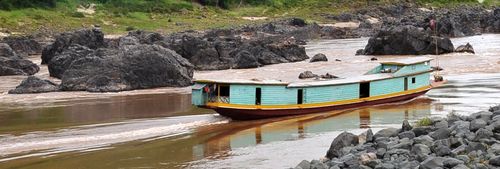Tucked away in the highlands of Hà Giang, the small…

Save the Mekong Statement Calling for Cancellation of The Don Sahong Dam
The Save the Mekong Coalition Stands With Mekong Communities: Calls for the Cancellation of Don Sahong Dam
The Save the Mekong Coalition urges Mekong governments to take immediate action to cancel the Don Sahong Dam before construction begins at the end of November.
The Government of Laos have announced that they intend to commence construction on the Don Sahong Dam, in Southern Laos, despite strong opposition to the project from local communities across the Mekong region, an absence of regional agreement and no resolution to the 1995 Mekong Agreement’s Prior Consultation process.
The Don Sahong Dam poses a significant transboundary risk to the Mekong’s valuable and irreplaceable inland fisheries. Blocking the Hou Sahong Channel will permanently disrupt fish migration and irreversibly alter the area’s complex ecosystem, with far-reaching consequences for food and livelihood security throughout the region. Yet, the Environmental Impact Assessment and other studies carried out for the Don Sahong Dam fail to take into account the complexity of the area and its close proximity to Cambodia, as transboundary impacts are not evaluated. The studies lack sufficient baseline data, particularly in terms of fish species and migration patterns. Therefore many of the claims put forward by the project developers are based on mere assumptions.
We believe that in allowing the Don Sahong Dam to move forward, Mekong Governments are taking a severe risk in gambling with the future of food security and livelihoods in the region. The measures proposed to mitigate the loss of the Hou Sahong Channel to fish migration have never been tested in this region on this scale. No indication has been given as to who will be responsible if the proposed mitigation measures fail. It is unacceptable to proceed with the project in the absence of sufficient baseline data, evidence of the efficacy of the proposed mitigation measures, or clarity as to how any problems arising from the project will be addressed.

At a Special Session of the Mekong River Commission Joint Committee in January 2015, the Governments of Cambodia, Thailand and Vietnam each requested further studies on the implication of the Don Sahong Dam, including a transboundary impact assessment. The three governments also called for more time for consultation and an extension of the Prior Consultation procedure. However there is no evidence of response to these concerns, or of regional agreement between Mekong Governments to move forward with the project. The Government of Laos is again making a unilateral decision to move forward despite ongoing concerns, as with the Xayaburi Dam.
On November 11, more than 100 community representatives from Cambodia, Thailand and Vietnam gathered at The Mekong People’s Forum in An Giang, Vietnam, to voice their concerns over Mekong dams. Many of the community members spoke of the changes facing their rivers; of their shared concerns about the impact to fisheries, the ecology and hydrology of the river and the loss of land along the Mekong from planned dams, and what this means for their lives and livelihoods. Significant impacts have been felt since the first mega dams on the upper Mekong mainstream in China started construction, and in other Mekong tributaries from the Pak Mun Dam in Thailand, Yali Falls Dam in Vietnam, and now from the first lower Mekong mainstream dam, the Xayaburi Dam. Local community representatives present at the Forum were clear that the Don Sahong Dam cannot be allowed to be next.
Communities who would bear the majority of the impacts from the Don Sahong Dam have not received sufficient information or been meaningfully consulted about the project. At the Mekong People’s Forum communities presented a statement, which is presently endorsed by more than 8,000 local people from the Mekong River basin, along with 77 supporting organizations. The statement calls for Mekong governments to urgently hear the concerns of the people, and to respect the rights of local communities to take a key role in decision-making about the future of the shared Mekong River.
We, the Save the Mekong Coalition, stand with Mekong communities in support of their message to regional governments. We believe that a healthy Mekong River is vital for the prosperity and sustainability of the region. Every effort must be made to support and preserve the river’s rich biodiversity and ecosystem, as well as the lives, cultures and traditions that it supports.
There is too much at stake to gamble with the future of the Mekong River. We therefore call on leaders to take immediate action to cancel the Don Sahong Dam and seek alternative solutions to manage the region’s energy needs, which do not sacrifice the lives and livelihoods of their people.
Save the Mekong is a coalition of non-governmental organizations, local people, academics, journalists, artists and ordinary people from within the Mekong countries and internationally, working to keep the Mekong free flowing for present and future generations. PanNature is a Save the Mekong’s member.



